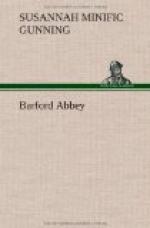I claim no right to controul your inclinations: the strict observance you pay your father’s last request, tempts me to give my opinion very opposite to what I should otherwise have done.—Duty like yours ought to be rewarded.—If you will content yourself with an incumber’d estate rather than a clear one, why—why—why—faith you shall not have my approbation ’till you come to the Abbey. Should you see the little bewitching Gipsy before I talk with you, who knows but you may be wise enough to make a larger jointure than you can afford?
I am glad your Lordship push’d the matter no farther on the terrace: I did not then know how well I lov’d our dear girl.—My wife is so pleas’d,—so happy,—so overjoy’d,—at what she calls your noble disinterested regard for her Fanny, that one would think she had quite forgot the value of money.—I expect my son to-morrow.—Let me have the happiness of embracing you at the same time;—you are both my children, &c. &c.:
J. Powis.
LETTER XXVIII.
Lord DARCEY to the Honourable GEORGE MOLESWORTH.
Barford Abbey.
Full of joy! full of surprize! I dispatch a line by Robert.—Fly, Molesworth, to Mr. Smith’s, in Bloomsbury-Square:—tell my dearest, dear Miss Warley, but tell her of it by degrees, that Mr. Powis is her father!—Yes! her father, George;—and the most desirable woman on earth, her mother!—Don’t tell her of it neither; you will kill her with surprise.—Confounded luck! that I did not know she was in London.
I shall be with you in less than two hours, after Robert:—I send him on, with orders to ride every horse to death, lest he should be set out for Dover.
Jenkings is now on the road, but he travels too slow for my wishes.—If she is gone, prepare swift horses for me to follow:—I am kept by force to refresh myself.—What refreshment can I want!—Fly, I say, to Miss Powis, now no longer Miss Warley.—Leave her not, I charge you;—stir not from her;—by our friendship, Molesworth, stir not from her ’till you see
DARCEY.
LETTER XXIX.
The Honourable GEORGE MOLESWORTH to RICHARD RISBY, Esq;
Dover.
Oh Dick! the most dreadful affair has happen’d!—Lord Darcey is distracted and dying; I am little better—Good God! what shall I do?—what can I do?—He lies on the floor in the next room, with half his hair torn off.—Unhappy man! fatigue had near kill’d him, before the melancholy account reach’d his ears.—Miss Warley, I mean Miss Powis, is gone to the bottom.—She sunk in the yacht that sailed yesterday from Dover for Calais.—Every soul is lost.—The fatal accident was confirm’d by a boat which came in not ten minutes before we arriv’d.—There was no keeping it from Lord Darcey.—The woman of the Inn we are at has a son lost in the same vessel: she was in fits when we alighted.—Some of the wreck is drove on shore.—What can equal this scene!—Oh, Miss Powis! most amiable of women, I tremble for your relations!—But Darcey, poor Darcey, what do I feel for you!—He speaks:—he calls for me:—I go to him.




